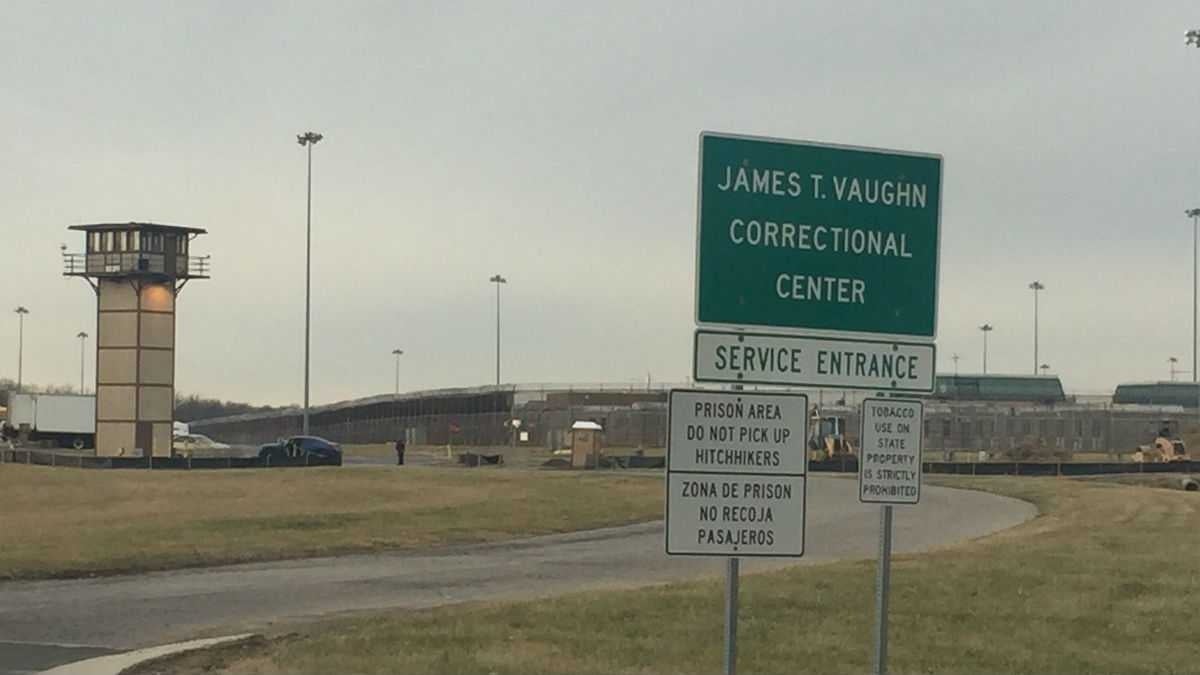Jury selection could be tougher in next four trials on Delaware prison riot
As the case moves on, finding new jurors whose objectivity is not tainted by their knowledge of the first trial could present a challenge.
Listen 1:44
James T. Vaughn Correctional Center in Smyrna, Delaware (WHYY, file)
The first of five trials for inmates implicated in the deadly February 2017 prison riot at the James T. Vaughn Correctional Center near Smyrna, Delaware, ended last week with verdicts for three defendants.
Over the next few months, the case will continue as other defendants are divided into groups for subsequent trials in connection with the rioting and death of Lt. Steven Floyd.
As the case moves on, finding new jurors whose objectivity is not tainted by their knowledge of the first trial could present a challenge.
Widener University Delaware Law School professor Judith Ritter said the Vaughn trial is not like other high-profile cases.
“What’s different here is it’s not just media coverage or tidbits — it’s access to specifically what witnesses said on the witness stand and what jurors in the first case thought about it,” she said.
“I think what they’ll have to do … is not necessarily find jurors who haven’t read any of the coverage, because that might be almost impossible,” she said. “But to try to find jurors who will convincingly tell the court they will be able to put what they read aside and just consider the evidence in the trial they’re sitting on as it comes from the witness stand.
“And even if jurors sincerely believe they can do that, there’s always a question as to whether a person is capable to do that.”
Last year, 18 inmates were charged — 16 of them with murder — in connection with the uprising. One defendant died in prison early Thanksgiving morning.
Last week, a jury found Dwayne Staats guilty of two counts of murder, riot, conspiracy, assault and kidnapping. Another defendant, Jarreau Ayers, was acquitted of murder but found guilty of all other counts. The third defendant, Deric Forney, was acquitted.
The verdicts came after three days of deliberation and four weeks of trial filled with testimony by inmate witnesses — often denounced by the defendants as unreliable — as well as testimony from the defendants themselves.
For the first trial, many of the 225 potential jurors interviewed said they couldn’t be unbiased because they had already formulated opinions based on media coverage. The court chose 12 members after four days.
“Lawyers are good at assessing a juror’s sincerity, and asking questions that are designed to try to get underneath what the juror is saying and see if they can identify any reasons the juror may not be capable of having a completely open mind,” Ritter said. “But there’s no magic to it, and it’s fairly difficult to do when you’re taking a chance — and that’s what happens when you have cases where jurors have been exposed to lots of information. The jury selection process may take longer than otherwise, and it’s going to be a concern.”
Depending on which side the verdict favors, attorneys may not care if the jurors have been exposed to the previous trial, if they think it will be helpful to their case, Ritter said.
Repeat witnesses could bolster the case for prosecutors — or for the defense.
“A defense lawyer having access to what a witness already said in a first trial, they can use that to anticipate. If the witness says something different in the second trial, credibility can be impeached, so there’s lots of benefit to having some witnesses testify,” Ritter said. “There’s also a downside in that witnesses can get better sometimes, be stronger a second time around, witnesses who are new may be exposed to what other witnesses have said.”
Jury selection for the second group of inmates was originally estimated to begin Nov. 13, but the first trial continued through that date. A new date for jury selection has not yet been scheduled.
WHYY is your source for fact-based, in-depth journalism and information. As a nonprofit organization, we rely on financial support from readers like you. Please give today.



